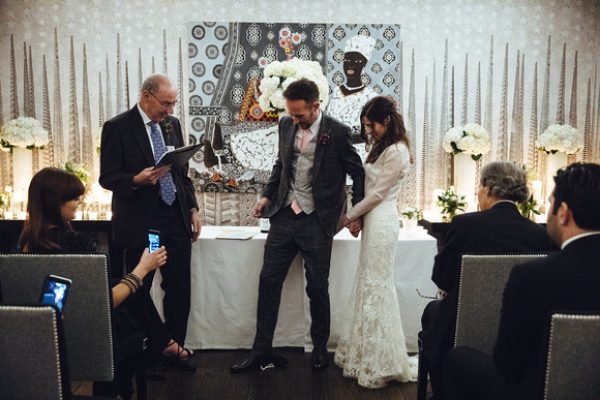
by Michael | May 29, 2018 | Blog
To many people, a wedding needs to be either fully religious or else secular (held in the register office). Well, those won’t float everybody’s boat.
Fortunately, you do have wedding choices. One is to opt for a civil celebrant .
Lots of people don’t know that civil celebrants even exist, so here are some Qs & As that should be beneficial.
Can a celebrant marry me legally?
The short answer, according to current English legislation, is no. However, there are two workable options to allow you to marry legally and also to enjoy the ceremony that you actually want.
1) you can have registrars in attendance (provided the venue has the appropriate licence); when they’ve done the legal bit, they leave and the celebrant can take over and deliver your bespoke ceremony.
2) you can marry legally (with 2 witnesses) at the Register Office the morning or day(s) before the ceremony. The celebrant can then conduct what to all intents and purposes is a full wedding or a wedding blessing ceremony (in the venue of your choice). That way, everything is covered.
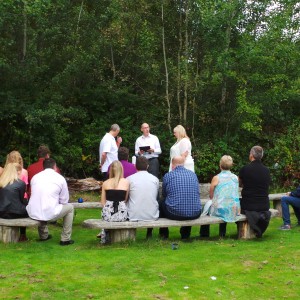
What’s the difference between the Registrar’s and Celebrant’s ceremony?
The short answer is personalisation.
A registrar will follow a script. Their ceremony must contain no religious references. The time-slot is limited (there is usually a ‘conveyor-belt’ system in operation). You won’t normally have met the registrar who will be conducting your wedding.
Certain words have to be said (to make the marriage legal).
None of the above applies to a civil celebrant. The celebrant offers personal and bespoke service. You can choose what goes into – or is left out at- your ceremony. You also have freedom of choice of venue and even hour.
Would it be a humanist service?
It depends on the celebrant. A humanist, like the registrar, is not permitted to offer any religious content. I am not a humanist, but I can conduct secular services. I tailor the service absolutely according to your beliefs and wishes. I have conducted a wonderful handfasting wedding, which was a fusion of paganism and Judaism!
How are celebrants overseen?
Many celebrants belong to a body that has strict codes of ethics (I belong to the AOIC, for example). These normally ensure that standards are being adhered to, although, in my experience, celebrants are professional, competent and trustworthy.
What about fees?
These will vary between celebrants and, obviously, need to take into account travel, possibly, board and lodging, and any unusual accessories requested.
The amount of work that will go into creating and performing a ceremony will depend on the type of ceremony required, so there’s no hard-and-fast rule. Personally, I usually give clients a firm quotation after our initial chat.
My fees include plenty of contact with clients and as many revisions to the script as we need. Naturally, I conduct the service too. There are details of what is included on my website (www.vowsthatwow.co.uk) and I always send a clear summary in my Ts & Cs, once I have had the introductory chat with my clients.
What restrictions are there to the ceremony?
Beyond what I have already mentioned (especially on the legal side), as long as your requirements are within the realms of decency and reason, you can have what you want at your wedding.
- If you want to dance down the aisle or wear Superman outfits, you can!
- You can get married where you want (within reason) – that includes outdoors, of course, and could be in a hot-air balloon, say
- Your ceremony can include your choice of music, readings, rituals and participants
The idea is that I work together with you towards your big day. The ceremony should reflect your personality and be fun (where appropriate), meaningful and memorable.
That’s where a good celebrant comes in …
Please contact me for a chat.
Featured image: www.lyndseygoddard.com
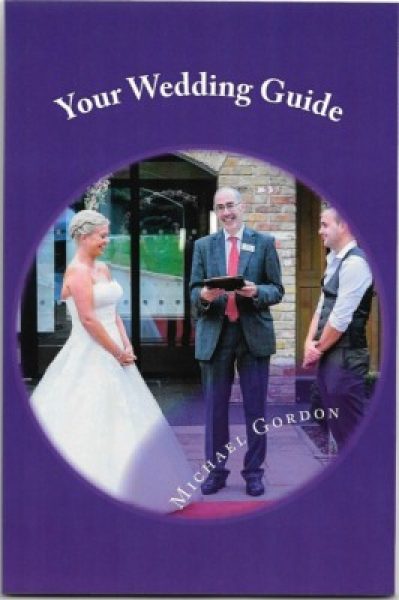
by Michael | May 1, 2018 | Blog
If you decide to plan a wedding yourself, go into it with eyes wide open.
As with most things, you have to put in the work in order to ensure success. And it doesn’t make any real difference whichever end of the market you are aiming at.
If you’re willing to take advice and are prepared to work hard, then you can do it!
Here’s how you can get started.
Hiring professionals
You are likely to be hiring professionals, which could include all or some of the following: wedding planners, photographers, caterers, celebrants and florists. How do you know which to choose?
 source: neliprahova.com
source: neliprahova.com
Don’t go with the first quote you receive, even if it seems reasonably-priced. Ask two or three suppliers. Better still, try and arrange a personal meeting. Skype or, at least, phoning are a good second best). That way you can ask questions directly and get a feel for the supplier’s personality and professionalism. If you take an instant dislike to your celebrant, say, you won’t want to work with them over the course of the year or so while the service is compiled. You certainly won’t be eager for them to conduct your actual ceremony!
Testimonials (especially first-hand) and web-sites can be very informative too.
Preparation
Obviously, don’t leave things till the last moment, but allow reasonable time. Success is in the planning.
To avoid disappointment, especially when looking at venues, get in as early as you can.
You need to be prepared (lists are good!) so that you do not spring last-minute surprises on your suppliers. Maybe you have specific dietary requirements for the caterer – don’t leave them till the day before!
You need to read Ts & Cs carefully and be sure of what you can expect from the supplier.
Venue
You will have to choose your venue carefully. Depending on budget and climate, the world is almost your oyster. You can save money by planning the wedding out of season or at an unusual venue (such as a beach or field). The time of day of the reception can also be significant for pricing.
Expenditure
If you are trying to reduce expenditure, take care not to stint on what really matters to you (be it clothing, the guest-list or whatever). You might be able to cut some corners elsewhere. It should go without saying, but don’t take unilateral decisions! Consult with your partner before you act!
Keep within budget!
Don’t forget to organise accommodation, both for yourself and for out-of-towners, if necessary.
If you leave yourself plenty of time (and make notes and ask questions), there’s no reason at all why your big day can’t go completely smoothly. As long as you have thought through what you want, your every desire can be fulfilled.
My gift to you
My “Wedding Countdown Checklist” details what needs to be done and by when. To receive it completely free of charge, please e-mail me at celebrant@vowsthatwow.co.uk.
Alternatively, for about £5 on Amazon, you can purchase my book “Your Wedding Guide” (https://amzn.to/2KaS6jv). You know, I can heartily recommend it!!
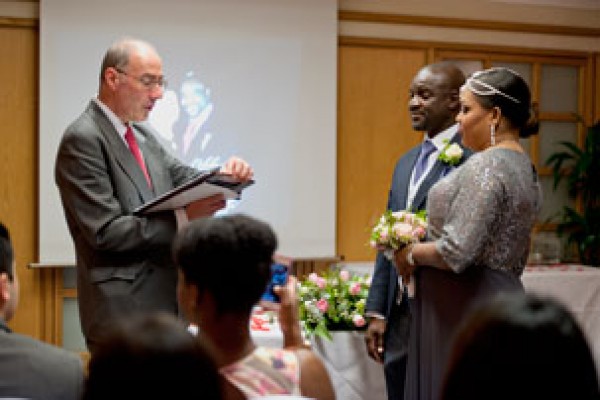
by Michael | Apr 24, 2018 | Blog
You know how conversations go in unexpected directions? I thought an acquaintance of mine had merely been on holiday. Actually, she had gone on a cruise. While at sea, the captain performed a lovely vow renewal ceremony, for herself and her husband.
Why hadn’t she thought of using me?! I had to forgive her because she wasn’t aware that I could have conducted such a ceremony. (Mea culpa …)
I wonder if the smart naval uniform might have had something to do with it too?!
I asked what had made them opt for the ceremony. They were celebrating 13 years together, and renewing their vows “just seemed like a good idea at the time”. And why not?
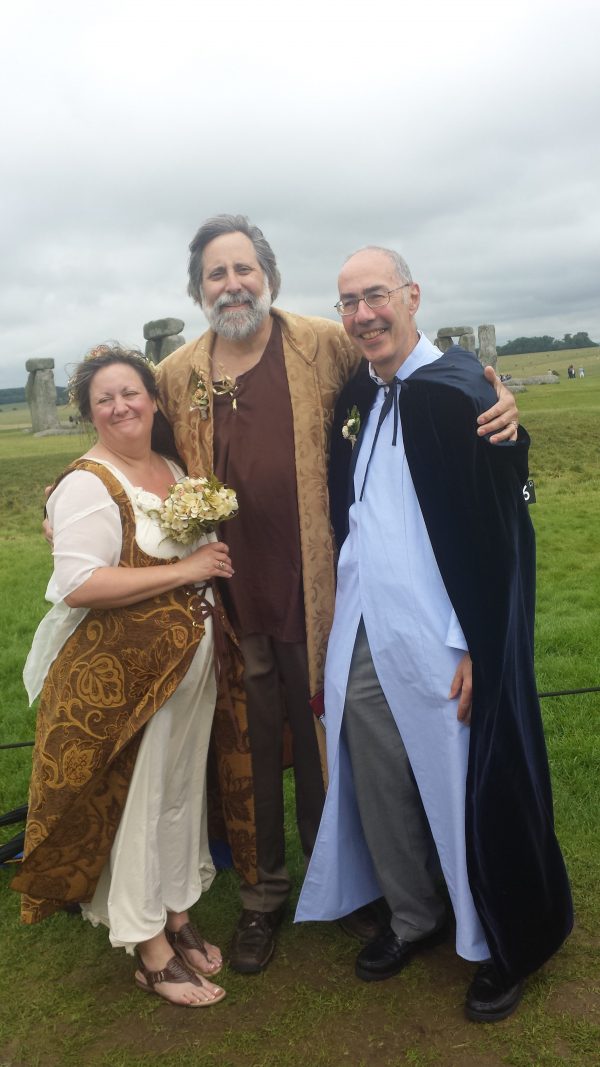
Not quite the naval uniform, though …!
So why bother renewing your vows?
- You may, like my acquaintance, be in a secure relationship, and want to mark it publicly.
- Perhaps you want to celebrate an unorthodox number (such as a 13th anniversary); commemorating a significant milestone (ending in a 5 or 0) makes sense too.
- You may originally have eloped or had a small wedding, and would now like to share your delight with your friends/family.
- Maybe your wedding didn’t meet expectations for some reason (poor weather, an argument, disappointing service) and you want to make up for it.
- You’ve come through a rough time (infidelity, illness, financial difficulties) and want to affirm to the world that you are sticking by (and with) each other.
- You want to strengthen your relationship by a public reaffirmation.
What you won’t need
Because a vow renewal is not a wedding, you won’t have to worry about any of these:
- Rings
- Hen party/stag do
- Wedding list (no, come on, you don’t need any more presents!)
- Stuffy rituals (you can organise what you want, if you have a civil celebrant)
- Venue (you can do this almost anywhere)
- A reception (unless you choose otherwise)
Organising a vow renewal is simple enough.All you have to do is fix a time, place and a date, invite some friends and choose an officiant – oh, and look forward to a wonderful, meaningful day!
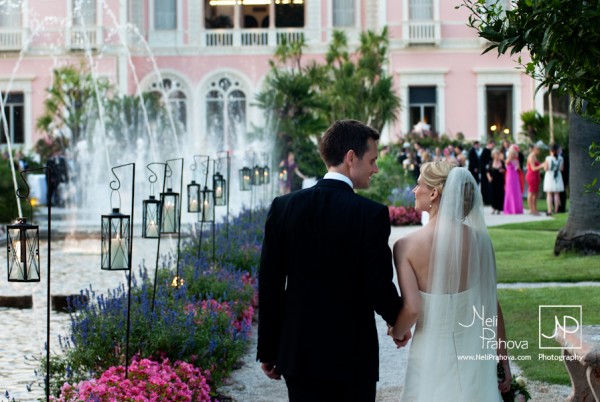
by Michael | Apr 17, 2018 | Blog
So your mind is on your approaching big day? The wedding ceremony is crucial (but you will be in safe hands with your civil celebrant).
However, once that part is over, what happens next?
Don’t fret! If you have hired a toastmaster, they will advise you. As should your (or the venue’s) Event Planner. However, you’ve arrived at my blog and I can offer you a guide to put your mind at ease.
Arrival
You may form part of a receiving line to greet the guests. It will normally consist of the bride’s parents (the hosts), the groom’s parents, bride, groom and, if desired, attendants (in that order). (If it’s a smaller reception, it might just be you.)
This can take quite a time, and it may be preferable to dispense with this – PROVIDED that you (and, possibly, your parents) circulate during the meal. Remember, everybody will want to congratulate you!
The Meal
At a sit-down reception, the bridal party occupy the top table. Traditionally, they should be (from left to right as viewed by the guests): chief bridesmaid, groom’s father, bride’s mother, groom & bride, bride’s father, groom’s mother and best man.
There ought to be a table-plan and/or place-cards for guests. Obviously, ensure there are enough chairs available for all!
Thank you
If it’s not too formal, or a buffet, you and your new spouse will circulate, as I’ve suggested, briefly thanking guests for coming. You return to the table for the cake-cutting, speeches and toasts.
Cutting the cake
The bride places her hand over the groom’s and together they cut the cake. (It may be worth cutting it in advance, if the icing is very hard!) Someone else will cut the cake up and distribute it to everybody. (You may want to send some pieces to absent friends, so reserve these.) You traditionally keep the top tier (for the christening of the first child).
Speeches and Toasts
Ideally, they will not be too long! Incidentally, I can offer some tips on presenting (please see my blog: https://vowsthatwow.co.uk/delivering-a-wedding-speech/) .
The bride’s father will toast the couple; the groom replies on behalf of himself and the bride (thanking the bride’s parents for the wedding, the guests for attending and for their presents and toasting the bridesmaids); the best man replies on behalf of the bridesmaids and reads out any messages from absent friends.
At the end
You normally leave first (announced by the best man).
Job done!!

by Michael | Apr 13, 2018 | Blog
Garden ceremonies. Are they a good thing?
You’re taking something of a gamble, if you arrange an outdoor ceremony in the UK. Of course, you can get rain in Spain (though not usually in the Summer), and there are occasional lovely days even in the UK!
Be that as it may, people are increasingly opting for home or garden ceremonies. There are ways to make planning the occasion less stressful.
It should go without saying that your celebrant will plan the actual ceremony with you in advance as well as, on the day, meeting with participants, to confirm their roles.
So we can take that part of the arrangements for granted.
The Venue
You will obviously need a suitable-sized room or garden to accommodate the number of guests you are inviting. What sort of Plan B do you have in the event of bad weather?
You will need to consider the age and health of your guests, and the length of the ceremony. You will need adequate chairs, at least for disabled and/or elderly guests. Consider wheelchair access, if appropriate.
You might need to provide cover from sun (or rain!), at least for the main protagonists. Have cool drinks ready, if it’s a hot day. Don’t forget that you may need to make a table available to be used during the ceremony.
Ensure everything is laid out well in advance of the first guests’ arrival.
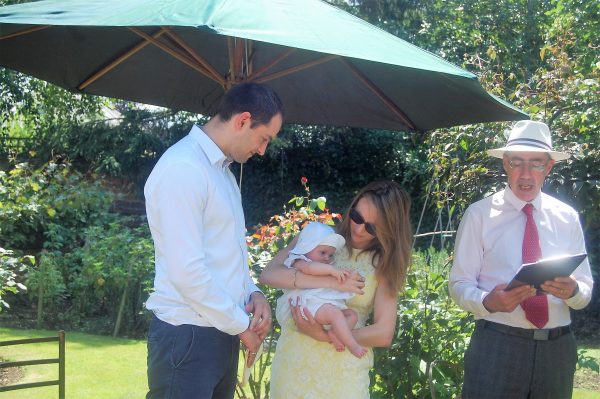
Disturbance
When you hold a ceremony outdoors, factors may enter into the equation over which you have limited – or no – control. There is the risk of all manner of disturbances, such as aircraft, lawnmowers, animals, neighbours etc.
You can ensure that your pets are shut away, if they are likely to disturb the ceremony. You may be able to liaise with neighbours. Warn them that there will be a lot of cars parking nearby on the day and explain that you would appreciate quiet for about half an hour from a certain time. (Inviting them to attend may be clever psychology!)
If you are expecting disturbances (eg you are on a flight path), it may be better to hold the ceremony inside.
Alcohol should not be served before the end of the ceremony. There is nothing worse than rowdy guests spoiling the atmosphere!
If laying out chairs, try and leave some at the back for latecomers. If VIP guests are late, it may be possible to delay the ceremony (at the celebrant’s discretion). Avoid leaving guests exposed unnecessarily long to whatever the climate is doing – or keeping children fidgeting too long.
Health & Safety
Yes, the boring bits!
Your domestic insurance will need to cover third party liability to visitors.
You’ll have to ensure entrances/exits are clear and safe, and that any garden structures (eg marquee) are safe and secure. Electrical equipment must be safe, with no trailing wires/cables. Water features should be treated as a hazard.
Holding a ceremony at home usually works out cheaper than holding it at a venue like a hotel. However, it probably loses out as regards stress. Apart from all I’ve already mentioned, there’s the catering (and logistics etc.) after the ceremony to be considered. An event planner will take away the stress, but will obviously hike the cost up.
There’s quite a lot to bear in mind, but with garden ceremonies can come the most amazing atmosphere. With planning and consideration, there is no reason why you cannot hold a truly memorable ceremony at your home.









